Mark Ruffalo had
quite a Sundance Festival. His directorial debut Sympathy for
Delicious premiered to mixed reviews, but it was his latest
independent comedy/drama which really made a splash.
The Kids Are All
Right
is the acclaimed film, the story of an aging lesbian couple (Annette
Bening and Julianne Moore) whose life is thrown into disarray when
their teen children decide they want to meet the sperm donor who
gave them life. Ruffalo plays the donor, Paul, the good-natured,
hippyish owner of a natural foods restaurant. Paul befriends the family,
but his easy-going charm eventually causes cracks in their stable
home.
Of course, itís
only natural for Ruffalo to make an impression. In a film career
that has lasted over ten years now, he has easily jumped back and
forth from acclaimed independent features like You Can Count on
Me, The Brothers Bloom and Eternal Sunshine of the Spotless
Mind to big-budget Hollywood fare like Shutter Island, Zodiac
and 13 Going on 30.
About a week
before The Kids are All Right was to open,
Ruffalo met with us
and several other websites at the Waldorf-Astoria in New York City
to discuss his latest film and his interesting, quirky career.
What made you
want to play Paul?
I thought it was
a really interesting turn on kind of an American iconic life
character Ė a kind of Peter Pan bachelor who lives his life purely
for his own pleasure. A lot of us have looked up to people like
that and wanted to be one. Then he has this really nice turn in it,
when he meets his biological kids. They make him a pile of mush.
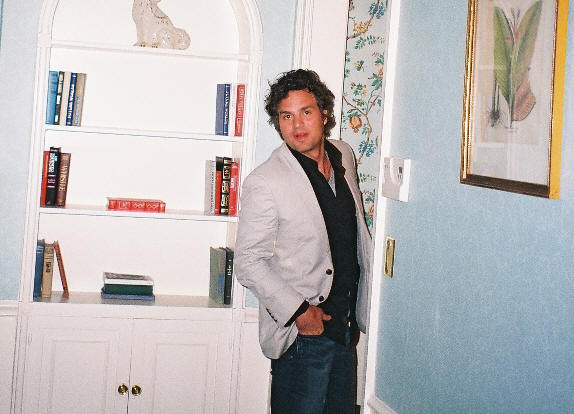 How do you think
youíd react if you suddenly learned you had grown children you never
knew about?
How do you think
youíd react if you suddenly learned you had grown children you never
knew about?
That would blow
me away. That would be a lot to handle. (laughs) I think I
could get around to caring for that person. But that would be very
disruptive, to say the least. (laughs again)
Is this role very
close to home for you? I know youíre a vegetarian, too.
I think I
approach life and people with the same kind of attitude that Paul
had. I think the guy has a fairly open heart. Heís not too
judgmental of people. Heís interested and heís adventuresome and
heís got a sense of humor to him that I relate to. I donít have the
confidence that he has. I never had the confidence with ladies he
had. (laughs) And I wish that Iíd found a sperm bank when I
was in my early twenties. (laughs again) Think of all the
wasted talent. But as far as the rest of it, itís people. Itís an
amalgamation of people that Iíve really known and loved over the
years.
At Sundance you
had two films. What was the sequence of you directing your film and
doing this one?
I directed my
film. I was in post when I got the call for this. It didnít look
like it was going to work out with my schedule to do this. I was
literally shooting basically when I had to deliver my movie and I
had been away from my family. It was a tough year. So, I was
thinking I needed a break. They couldnít move their dates around,
so it sort of looked like it wasnít going to happen, which was
really heartbreaking to me. I was telling my wife about it all the
time. In fact, finally she was texting Julie Ė theyíre friends Ė
and she said ďWhatís up with that movie? I love that movie. Mark
loved that movie. Whatís going on with it?Ē They were like, ďThe
partís open. Would he do it?Ē She was like, ďYeah, he wonít talk
about anything else.Ē So it kind of came together. I was still
editing when we shot it. I had some finishing work to do on the
movie, so I was between [the two films]. But I only ended up
working really like seven days, I think.
Was it
interesting watching them back to back? Totally different reaction
to the two moviesÖ.
Totally. It was
a very wild ride at Sundance. My movie opened to some really
mean-spirited reviews that eventually really turned around, but the
first round was very painful. Then this movie, which was such a
huge success immediately out the gate and then my movie taking a
special jury prize at Sundance. It turned out to be incredibly
drastic swings between elation and depression throughout the whole
thing.
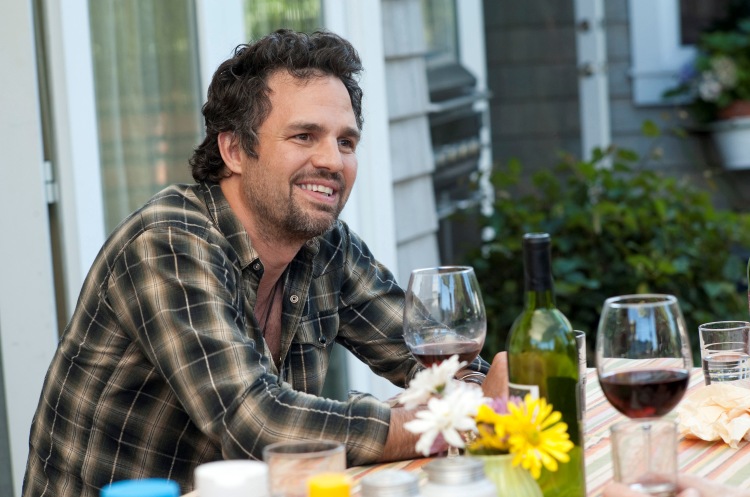 The outcome for
your character is kind of tragic in the film. What did you feel
about that?
The outcome for
your character is kind of tragic in the film. What did you feel
about that?
Growth is
painful. (chuckles) I think he gets spanked. But I like
to think that he is going to have a relationship with his kids and
that heís going to buy a minivan. (laughs) You go from the
beginning of the movie Ė that guy doesnít have to beg a woman for
anything. And would never do it, too. Like, begging Julie to stay
with him and begging his daughterís forgiveness. In a weird way, even
that look to his son is begging for something, you know? Some
connection. I think thatís a big change for him.
Do you think
heíll grow from it?
People change
incrementally. I think the whole idea of having a family is
possibly being entertained in a more serious way.
What about being
so irresistible that a lesbian canít refuse him?
I think Paul is
like half a lesbian himself. (laughs) No Iím kidding. You
know, heís got one foot in the door. He had two kids with her. So
I think itís a confluence of a lot of different circumstances
that they end up together. To me, the real telling nature of the
relationship is when sheís riding him and using his face like a
riding pummel on a horse saddle. That kind of says it all. I donít
think there was really a deep connection other than just purely
physical. I donít know how real that relationship really is.
I think it
addressed some issues that are often debated and put them in an
interesting context. Have you met people that youíve talked to who
were in a similar situation?
I havenít met
anyone who has had this particular situation.
Well, no, of
course, but a man who got involved with a woman who was out of a
lesbian relationship or someone who goes back and forth?
Itís
interesting. Lisa is probably the one who could really talk about
this. She understands it way better than I do. To make those
jumpsÖ I think statistically more people are on the fence than not.
When it comes to sex, people have all kinds of kinky things that
turn them on that I donít think always reflect so much who they
are. Well, they certainly donít make it in the movies. Not these
kinds of movies.
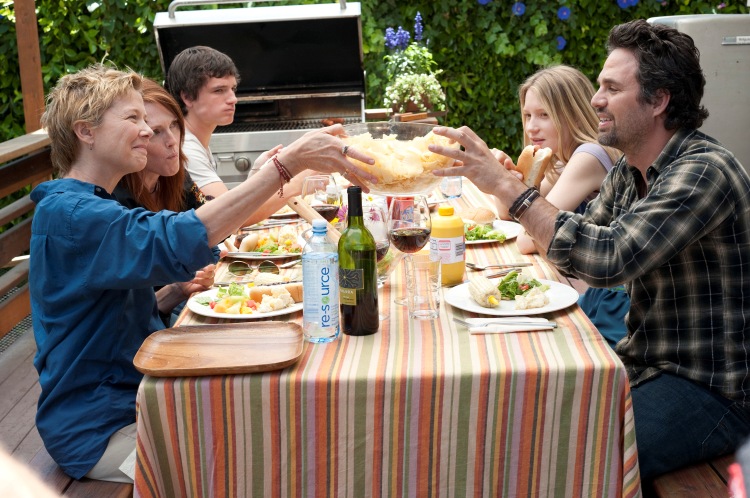 You have worked
with Julianne before, and you know her outside of working. Did that
make it a little easier to do such intense scenes with her?
You have worked
with Julianne before, and you know her outside of working. Did that
make it a little easier to do such intense scenes with her?
Yeah. Yeah. I
mean, your dream is to work with people who you have a vernacular
with. Who youíve worked with, you feel comfortable with. You can
work well with people like that. We went throughÖ Blindness
was a tough experience. It was a hard movie to make. We had a
great time, but the subject matter is intense. So youíre going
through something. Sheís friends with my wife [actress Sunshine
Coigney], which certainly is helpful with doing
those sex scenes. (chuckles) To go to work and not have my
wife be like, ďAre you doing the sex scene today? Who is this
girl? You like her, donít you?Ē She loves Julie. She trusts her.
So, in a weird way, it was a lot easier. (laughs)
Lisa and Stuart
worked on the script for a long time. How complete was Paul as
written when you got involved?
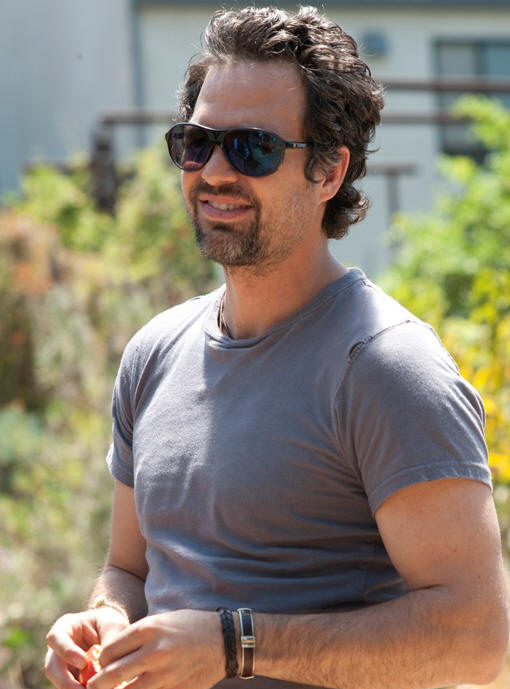 When I read
something, a big part of it is daydreaming. Iíll start to get an
image of the person. It was pretty clear to me who he was from the
script. I mean, itís filtered through my interpretation.
When I read
something, a big part of it is daydreaming. Iíll start to get an
image of the person. It was pretty clear to me who he was from the
script. I mean, itís filtered through my interpretation.
Were there
changes to the character and scenes once you came on board?
No. No. It
pretty much stayed the same. At some points Iíd improvise a line
here or there, if I felt like there was a chance for humor in a
place. LisaÖ I think what makes her such a great director is she
really is interested in subtext and whatís happening between the
lines, so you had a lot of behavior off the lines, people responding
to little looks. Even when the camera is not on you or youíre not
speaking, something happens after a scene. Those are the flourishes
that you put on as an actor.
Your indie film
roles really seem to display your talents; I think more so than your
Hollywood roles.
You get to do
more. (laughs)
I was wondering
if you got frustrated by playing a lot of cops and stuff.
Well, Iíve gotten
to play some great cops. (laughs) Indie films are usually
more character driven just because of the nature of it. You canít
do too big of a plot for a start, because you donít have the time or
the money. Iíve worked with real formal filmmakers and very
informal filmmakers. Very kind of loose camera Iíd say filmmakers.
Both have their own challenges. Iíd like to get a nice beefy, juicy
role in a feature film that was a big, big studio movie. Thatís
outside of my control. I hope that would happen, but I also feel
lucky that Iíve gotten to work with great people and Iíve learned a
lot.
I wouldnít begrudge where Iím at.
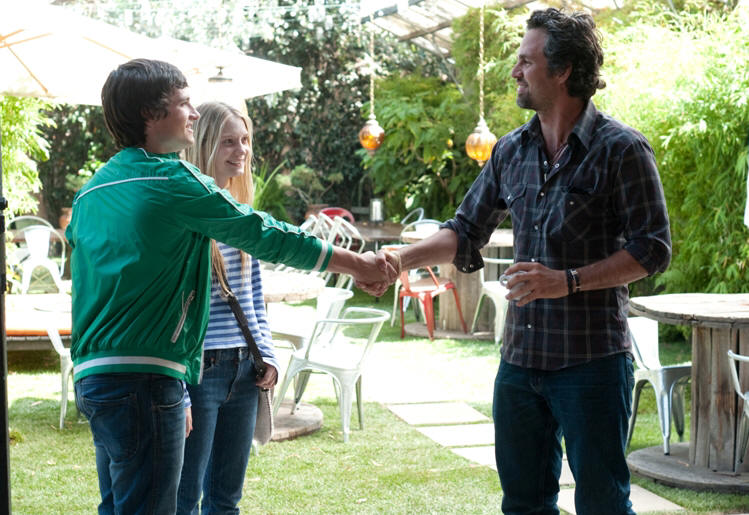 Is there more
directing coming?
Is there more
directing coming?
Yeah. Honestly,
by the time I finished this movie last year, I was like, thatís it.
Iím done with acting. Iím going to just direct.
You Can Count On
Me is my favorite acting job of yours. I was just wondering what
was happening with Margaret [writer/director Kenneth
Loneganís long-awaited follow-up film, which was filmed in 2005 and
starred Ruffalo, Matt Damon and Anna Paquin].
Buddy, you and me
both. I donít know what is happening with that. I keep hearing
that rumblings that it is coming out any time nowÖ. But you
probably know as much about it as I do, honestly.
CLICK
HERE TO SEE WHAT THE KIDS ARE ALL RIGHT CO-STAR JULIANNE
MOORE HAD TO SAY TO US!
CLICK
HERE TO SEE WHAT THE KIDS ARE ALL RIGHT CO-WRITER AND
DIRECTOR LISA CHOLODENKO HAD TO SAY TO US!
CLICK HERE TO SEE WHAT MARK RUFFALO HAD TO SAY TO US IN 2004!
Email
us Let us know what you
think.